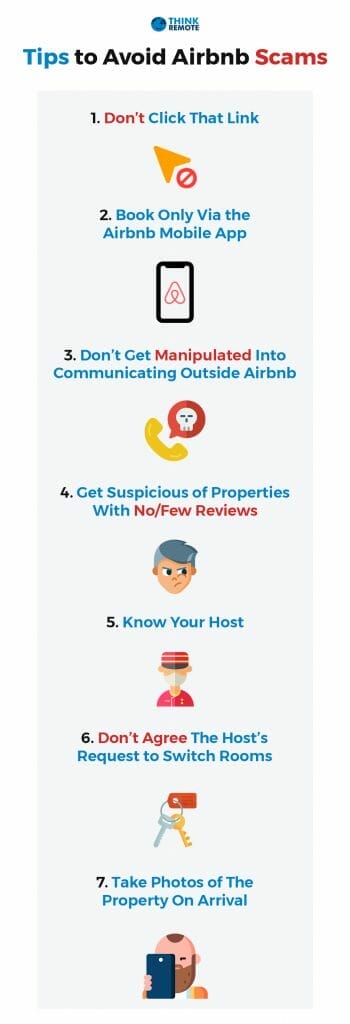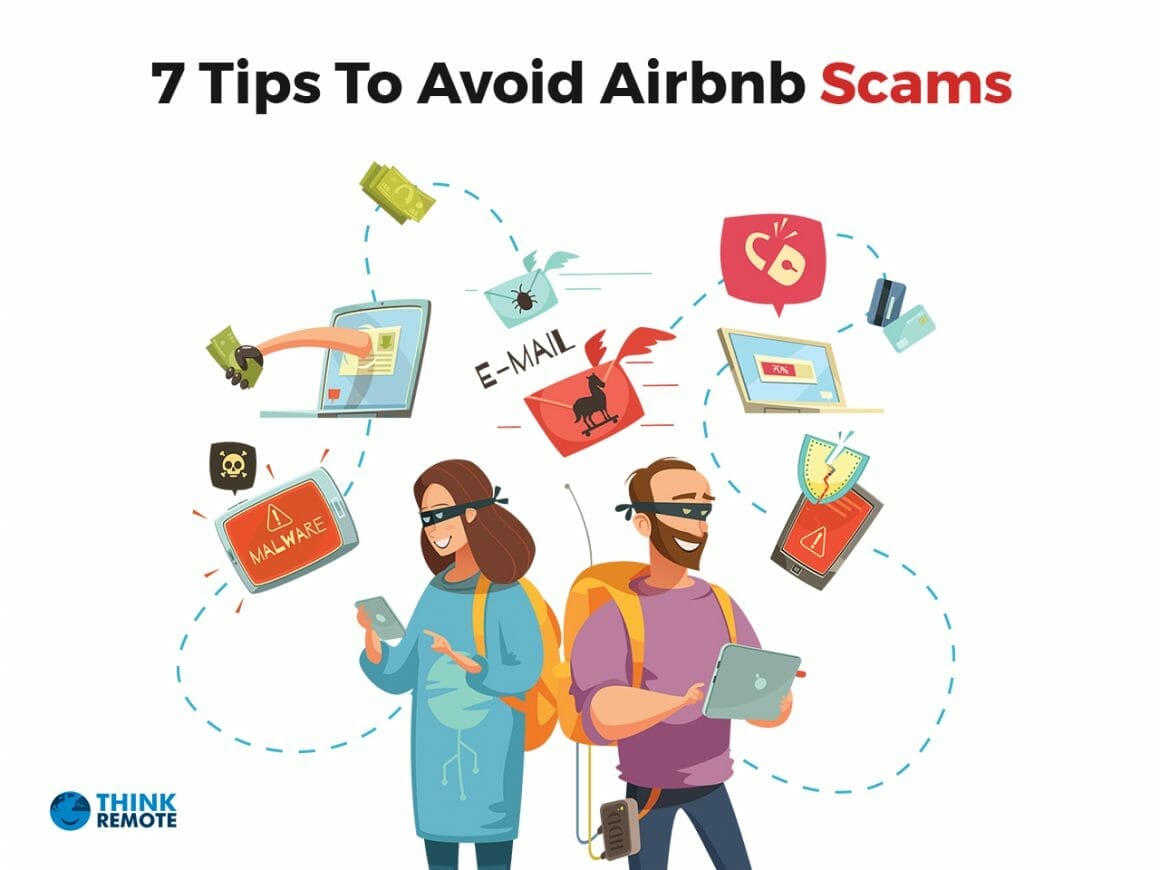Airbnb has changed the way people travel. Previously, most travelers could only stay in hotels or bed and breakfast-style establishments. Now, digital nomads have all essential resources to work and travel the world. Airbnb has allowed guests to experience life as a local by renting out people’s apartments and homes. In the era of the digital nomad boom, Airbnb has become nearly indispensable.
The website has grown in popularity and now has millions of members. The only thing spoiling this amazing experience are Airbnb scams. Hackers have launched scams aimed at naive remote workers and vacationers. Scammers may try to steer you away from the safe and secure Airbnb site to steal your money. Here we will help you with 7 tips that can save you from such scams.
Tips to Avoid Airbnb Scams

1. Don’t Click That Link
Keep this as a golden rule: only book on the Airbnb website. If anyone sends you a third-party website link, do not click on it. Request the listing’s headline and look it up on the Airbnb website. If the host shows no interest, avoids the topic, or makes an explanation, such as “it’s a private listing,” that’s a red flag. There are no private listings.
You may have become a successful digital nomad, travelling the world and working with the right tools from random locations. However, third-party links always seem to be a problem for travelers, especially when it comes to Airbnb reservations.
If you’re still unsure and the scammer is too smart, don’t worry. Airbnb’s guide to decoding suspicious emails is your go-to resource if you aren’t sure about a link you received.
2. Book Only Via the Airbnb Mobile App
The Airbnb mobile app will never direct you to a bogus website. You can rest assured that everything published on the app complies with Airbnb’s standard security requirements. That means you shouldn’t begin your search on any third-party app like Craigslist. Also, make sure you’re not viewing the property’s listing page in your smartphone’s web browser; instead, stay in the official app.
3. Don’t Get Manipulated Into Communicating Outside Airbnb
Conducting business or requesting payment outside of Airbnb is against the regulations; thus a legitimate owner would never do so. This rule is in place not just for the website’s benefit but also for your protection. If you book and pay for an apartment outside the Airbnb site, the company will not assist you if you are scammed.
Maybe you’ve just arrived and chose to work with other travelers to know all the updates about this new location you’re visiting. Well, in that case, you can talk to them all day long, but under no circumstances let them manipulate you to do this!
4. Get Suspicious of Properties With No/Few Reviews
Any property with fewer than 15 reviews is a huge red flag: it could be a newcomer to the booking services, or in the worst-case scenario, it could be a scam. The more reviews you read, the more certain you can be that what you see in the listing is exactly what you’ll get when you arrive at your Airbnb. When it comes to a property with few reviews, the basic rule is that if it appears too good to be true, it probably is.
Even under circumstances where you’re short on time, don’t rush it or book your stay without checking the reviews. Better safe than sorry!
5. Get to Know Your Host
It’s always a good idea to message and introduce yourself to your new host. If you have any concerns regarding their listing, now is the moment to ask them. Ask detailed questions and take screenshots of the responses to make sure that when you reach the destination, their promises are kept. Additionally, avoid booking a listing if the hosts are slow to react or never respond at all. If you arrive at a listing with an uninterested host, you may be left out in the cold.
6. Don’t Agree The Host’s Request to Switch Rooms
There have been reports of Airbnb renters asking guests to swap rooms (at check-in or during their stay) because the original room had an “issue.” This can be used to lure guests into booking a place that appears to be nicer than it is or to route several guests through a single listing for the same dates.
You have the right to deny a request to change from the original room you booked, regardless of your host’s explanation. If a host requests you to switch, you have the option to decline. The best thing to do in these cases is to contact Airbnb if the host still refuses to let you stay in the original room.
7. Take Photos of The Property On Arrival
There have been reports of hosts faking damages caused by their visitors. As evidence, a host can upload doctored photographs or make their location appear damaged. Alternatively, the guest may have caused damage, but the host inflated the refund amount in their Airbnb claim.
Take photos of the property when you arrive and check out to reduce the likelihood of a host incorrectly reporting damage. If your phone doesn’t save the dates and locations of your images, consider forwarding them to your host as you check out, so you have dated documentation of the place’s condition.
FAQs That Can Help You Avoid Airbnb Scams
1. How Does Airbnb Verify Hosts?
To become an Airbnb host, you must first validate your account. Even if you don’t do so immediately, you’ll be prompted to do so before your first payment is sent. Verification covers the following steps:
- Uploading a government-issued photo ID.
- Using the Airbnb app to take a selfie so they may compare it to the photo on the ID.
- Connecting your social profiles by verifying your phone number and email.
- For payout, you’ll need to enter your bank and tax information.
With all of this information, there’s no way one can get away with a scam. The host becomes extremely traceable because of this in-depth verification process.
2. How Does Airbnb Payment System Work?
When guests book a room on Airbnb, they are charged the full fee. Hosts are usually compensated within 1-2 days after their arrival, once the guests have checked in. The hosts get paid monthly if guests stay in the rental for more than 28 nights.
If a host is completely new to Airbnb and has their first reservation, it may take up to 30 days for Airbnb to pay them.
Airbnb hosts can check their transaction history to see outstanding payments and what payments have been received.
The accepted forms of payments are as follows:
- Direct Deposit
- Western Union
- PayPal
- Payoneer
- International Wire
- AIS Debit Card
3. How Does Airbnb Protect Guests?
Once the reservation is made, Airbnb’s 24-hour customer support line will resolve any problems that may arise, and it will issue refunds if one of the following three criteria is met:
- The host cancels the reservation just before check-in or fails to provide access to the booked property.
- The booked listing is misrepresented or missing promised amenities or items.
- The booked listing is not clean or as stated.
Safeguard Yourself Against Airbnb Scams
Homestays are fantastic and can help you save a lot of money. Especially if you’re traveling in a group or for a lengthy period of time.
But unfortunately, scams occur.
Do your research to avoid them. Use your common sense and trust your instincts. You can never be sure that what you see in a listing is exactly what you’ll get at an Airbnb rental. So, in the end, it all boils down to your risk tolerance. But when it’s about payments and phishing Airbnb scams, it’s best to be extra careful to avoid being a victim of fraudulent transactions.
Above and beyond anything, follow your gut.






